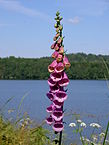Plant Family: Plantaginaceae
Botanical Name: Digitalis purpurea
Alternative Name: Foxglove, Common foxglove, Purple foxglove or Lady’s glove
Folklore: It has been suggested that juice of foxgloves was once ritually collected and put in the center of a circle in order to attract fairies. It is said the leaves can help break fairy enchantments and you should plant foxgloves anywhere you wish to invite the fairies to come and visit!
Digitalis has been used from early times in heart cases. It increases the activity of all forms of muscle tissue, but more especially that of the heart and arterioles, the all-important property of the drug being its action on the circulation. The first consequence of its absorption is a contraction of the heart and arteries, causing a very high rise in the blood pressure.
Digitalis also contains loliolide, a potent ant-repellent which was once used as an insecticidal disinfectant for walls in the Forest of Dean, England.
Medicinal Uses: Digitalis has been used from early times in heart cases. It increases the activity of all forms of muscle tissue, but more especially that of the heart and arterioles. After the taking of a moderate dose, the pulse is markedly slowed. Digitalis also causes an irregular pulse to become regular. If administered in high enough doses, Digitalis can lead to nausea, vomiting, diarrhea and death. Foxglove tea was taken for colds, fevers and compresses were used for ulcers, swellings and bruises. Its most common use was as a diuretic against dropsy (accumulation of fluid in the tissues), for which it was sometimes effective, but occasionally proved fatal.





